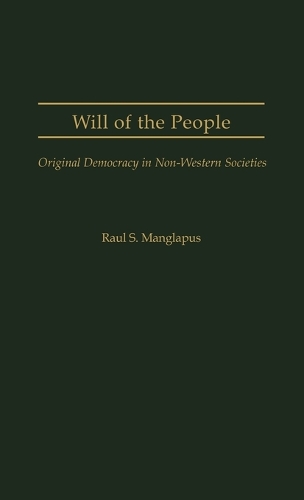
Will of the People: Original Democracy in Non-Western Societies
(Hardback)
Publishing Details
Will of the People: Original Democracy in Non-Western Societies
Bloomsbury Publishing PLC
Praeger Publishers Inc
14th May 1987
United States
Classifications
Tertiary Education
Non Fiction
321.8
Physical Properties
Hardback
194
Width 140mm, Height 216mm
369g
Description
This timely and fascinating historical study of democracy in non-Western societies will increase the reader's appreciation of the continued struggle for democratic change and independence that still occurs in many countries all over the world. Clearly written and extremely readable, this book provides a scholarly perspective on democracy and despotism, explores events and ideologies in various non-Western areas such as India, Africa, Mesopotamia, Korea, and Japan, and it offers some new and important thoughts in recent developments around the world.
Reviews
For those firmly convinced that modern democracy traces its roots to the Glorious Revolution of 1689 and spreads today by means of industrialization, education, urbanization, and market exchange, Manglapus's essay on indigenous non-Western democracies will serve as a corrective to analytical myopia and ethnocentric parochialism. Granted, much of Manglapus's discussion of non-Western democracies (e.g., the Mesopotamian Puhrum of 3,000 BCE, the Japanese kat-goshu, the Indian village Panchayat, the Malaysian Adat, the Polynesian fono, the Iroquoian Ongwanonhsioni, the Incan rimanacuy, and the Bantu Assembly) can be found in anthropological and historical treatments, most of them cited by Manglapus. But his attention to links between the ancient village and local customs, and the birth of rights, privilages, and responsibilities brings many of these disparate tracts together into a literate overview of the roots of pre-Western democratic traditions. The author's more general intent--to show how the democratic revolutionary impulse among non-Western peoples is related to currents of thought more fundamental than contemporary issues such as rising expectations--is generally well presented. Excellent for courses in comparative government or democratic theory. Academic and general readers.-Choice
"For those firmly convinced that modern democracy traces its roots to the Glorious Revolution of 1689 and spreads today by means of industrialization, education, urbanization, and market exchange, Manglapus's essay on indigenous non-Western democracies will serve as a corrective to analytical myopia and ethnocentric parochialism. Granted, much of Manglapus's discussion of non-Western democracies (e.g., the Mesopotamian Puhrum of 3,000 BCE, the Japanese kat-goshu, the Indian village Panchayat, the Malaysian Adat, the Polynesian fono, the Iroquoian Ongwanonhsioni, the Incan rimanacuy, and the Bantu Assembly) can be found in anthropological and historical treatments, most of them cited by Manglapus. But his attention to links between the ancient village and local customs, and the birth of rights, privilages, and responsibilities brings many of these disparate tracts together into a literate overview of the roots of pre-Western democratic traditions. The author's more general intent--to show how the democratic revolutionary impulse among non-Western peoples is related to currents of thought more fundamental than contemporary issues such as rising expectations--is generally well presented. Excellent for courses in comparative government or democratic theory. Academic and general readers."-Choice
Author Bio
PAUL S. MANGLAPUS is President of Democracy International and former President (now International Vice-President) of the Center for Development Policy.
